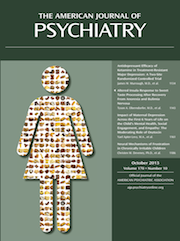Joel Paris has written an erudite, intelligent, thoroughly researched work on the benefits of brief evidence-based psychotherapy in this epoch of disintegrating family and community ties. He takes us down the path of the historical development of what Christopher Lasch (1) anointed as the “culture of narcissism,” ranging over viewpoints as diverse as those of Marx, Weber, Yeats, and Tolstoy and citing Kernberg (2) and Kohut (3) about the difficulties of treating patients who have a narcissistic personality structure. He cautions about the dangers of long-term psychotherapy with no clear goals in mind.
Then he offers a solution to treating people with narcissistic propensities, partly scientific and partly old-time morality and ethical concern for the family and children: a family-systems-oriented psychotherapy, primarily aimed at the unseen patients, the children (and their well-being). In this vein, we hear a bit of the late Judy Wallerstein (
4) and her admonitions that troubled parents should focus on the needs of their children and not just pursue their own individual desires. With a nice sense of humor, Paris boils all of his ideas down to one seminal one: this book is about helping narcissistic patients, in a narcissistic age, to get a life.
Paris agrees with the view that cultural narcissism, with the “self more important than social commitments,” is at the root of many of our current personal and societal difficulties (p. 77). The search for easy fame and satisfaction goes hand-in-hand with the narcissistic individual’s grandiosity, insensitivity, and lack of empathy for others. As an antidote to such cultural and individual narcissism, he suggests an “anti-narcissistic psychotherapy,” focused on a task greater than the self, one of commitment to love, work, and social connection.
Such a psychotherapy is achieved by both the therapist and the patient stepping back and observing oneself and society and coming to terms with a “good enough” orientation, instead of striving for perfection. Such a task is achieved by finding goals beyond the self. It is this last social connectedness that Paris holds out as the treatment for both cultural and individual narcissism. For him, it is the missing ethical ingredient that psychiatrists should include in their psychotherapeutic work. Rather than letting psychotherapy slip into the disease for which it was supposed to be the cure, psychotherapists should focus narcissistic patients toward involvement in life, work, relationships, and projects outside of themselves.
For example, in talking about the best interests of the children when a patient is a parent, Paris (apparently approvingly) quotes Amato and Booth (
5): “Spending one third of one’s life living in a marriage that is less than satisfactory in order to benefit children….is not an unreasonable expectation” (
5, p. 238). For patient problems when a family is involved, he encourages the practitioner to employ a family-systems approach, interviewing the spouse and sometimes seeing the family, rather than just listening to the narcissistic patient try to exteriorize blame and find fault with the unseen spouse.
This is a book about psychotherapists attempting to diminish individual narcissism and narcissistic traits by trying to ameliorate entitlement through helping patients to think and act beyond a preoccupation with the self. It is action in the world, beyond one’s own concerns, that Paris views as mutative. For him, the “best use of talking therapy is to help people get a life” (p. 133).
Who can argue with such clarity in such a well-researched and engaging book? I strongly recommend it for all practitioners, especially for those who may have lost heart in treating these difficult, narcissistic patients in these self-involved times.

